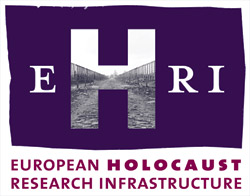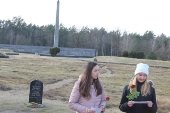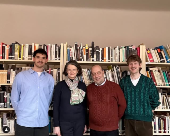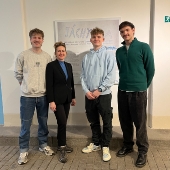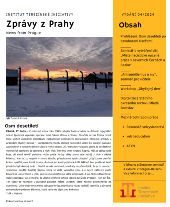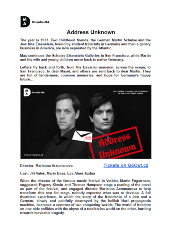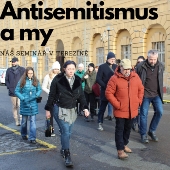Support - Database and Terezín album
The following private owners and institutions provided us with original documents and photos or their digitized copies for our project Terezín Album and Database of the Holocaust Victims.
Thank you very much!
Private owners of documents:
Ivan Čech
Maud Michal Beerová
Eva Herrmannová
Alena Vlčková
Helen Epstein
Petr Papoušek
Věra Baumová
Susan Waite
Věra Rovenská
Zdeněk Pošusta
Marie Löwitová
Věra Navrátilová
Patricia Berman
Tomáš Maier
Jaroslava Rybová
Hana Weingarten
Edna Becková
Jan Dítko
Eva Malá
Bohumila Urbachová
Dagmar Bálintová
Anna Kofferová
Joanie Schirm
Jana Witthed
Michael Rund
Ludmila Lázničková
Pavel Uri Bass
Zuzana Rousová
Pavel Fröhlich
Svatoň Skládal
Ilse Paschová
Anna Lorencová
Božena Ferjancová
Hana Cherynová
Kamil Rodan
Lenka Buchbergerová
Štěpána Piskláková
Dagmar Pavelková
Anna Matoušková
Renata Wohlgemuthová
Libor Haltmar
Libuše Gebauerová
Judith E. Elam
Štěpán Holzner
Arnošt Líbezný
Ol Rappaport
Martin Vigner
Barbara Hofmann Yerby
Anna Zatloukalová
Institutions:
Nadační fond obětem holocaustu - Foundation for Holocaust Victims
Muzeum Prostějovska - Museum of Prostějov region
Židovská obec Olomouc - Jewish Community in Olomouc
Městské muzeum Týn nad Vltavou - Municipal Muzeum in Týn nad Vltavou
Židovská obec Brno - Jewish Community in Brno
Obecní úřad Senožaty - Municipal Authority Senožaty
Yesterday, together with the participants of the seminar and excursion Bergen-Belsen on the Threshold of Freedom, we attended a reception at the British Embassy in Prague on the occasion of the 80th anniversary of the liberation of the Bergen-Belsen concentration camp by the British Army on 15 April 1945.
Anne Frank and thousands of others. We visited the place where the fate of one of the world's most famous stories came to an end, as well as that of countless of others. The Bergen-Belsen camp was burned down after the war, but one can still hear echoes of the past. How can we learn about the horrors that have gone to ashes?
Yesterday, we welcomed Director Denise Quistorp and Sebastian Halbauer from the Austrian Cultural Forum in Prague to our premises at Jáchymova to exchange views on our respective activities and projects. This gave us the opportunity to identify common priorities in our work and to further strengthen Austro-Czech exchange through future cooperation.
This week we received a visit from Ms Krejcova (Foreign Culture of Lower Austria) and Mr Halbauer from the Austrian Cultural Forum Prague, where we were not only able to present the work of the ITI, but also make personal contacts. We were able to discuss many topics that overlap with the work of our three institutions in order to promote Austrian-Czech exchange.
The MA Theater would love to cordially invite you to the Prague premiere of the theatre play Address Unknown, based on the 1938's best selling book by Kathrine Kressmann Taylor. The MA Theater's performance is taking place on the 28th of January at 7:30 PM at Divadlo Na Prádle, Besední 487/3, Prague 1. The play is performed in English.
You can learn more about the play here or in the attachment.
The year is 1933. Two childhood friends, the German Martin Schulse and the Jew Max Eisenstein, bound by student fraternity in Germany and then a gallery business in America, are now separated by the Atlantic. Max continues the Schulse-Eisenstein Galleries in San Francisco, while Martin and his wife and young children move back to native Germany.
Letters fly back and forth, from the Bavarian mansion, across the ocean, to San Francisco, to dear Maxel, and others are sent back to dear Martin. They are full of tenderness, common memories, and hope for Germany's happy future...
Direction: Marianna Arzumanova
Cast: Mario Baas, Jiří Valeš, Eva Alner
The original script, direction, scenography and soundtrack are work of Marianna Arzumanova, the director and founder of Prague's Theatre MA. The show premiered on 18th July 2022 in Verbier, and was shown again in London, New York, Geneve and Schloss Elmau, starring world-renowned pianist Evgeny Kissin and baritone Thomas Hampson.
From December 6 to 8, 2024, we hosted the seminar Antisemitism and Us in Terezín for teachers and peer educators from the Anne Frank Youth Network (AFYN). The event was organized in collaboration with European Practitioners against Antisemitism (EPNA), and with support from the German Federal Foreign Office.
Program and Key Speakers
The seminar offered a rich program focused on how to teach about antisemitism and the Holocaust in a way that has a tangible impact while avoiding unintended antisemitic outcomes. We were honored to welcome outstanding speakers:
- Tomáš Kraus, who guided participants through the authentic environment of the Terezín ghetto, sharing his family’s stories to enrich the educational experience.
- Jakub Drábik, who gave a lecture titled What is Fascism?, exploring its origins, manifestations, and methods of prevention.
- Peter Weisenbacher, who presented FRA research and additional data on how antisemitism is perceived and experienced by members of the Jewish community in Slovakia.






